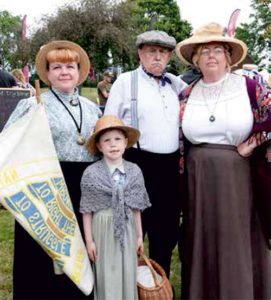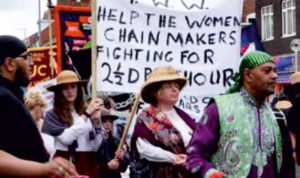
An annual event, featuring national entertainers and speakers, including a ‘MaryMacarthur’ in period costume delivering one ofMary’s rousing speeches and a procession of modern unions and ‘strikers’ dressed as Edwardian chainmakers, the festival ensures that this historic episode is celebrated by the local community and trade unionists from all over the country.
The Women Chainmakers’ Festival is coordinated by the TUC Midlands bringing together trade unions and community groups to host the only Trade Union run festival to celebrate the success of women. It is held at the Mary Macarthur Gardens in Cradley – Heath the home of the 1910 dispute.
The Gardens are watched over by an inspiring statue depicting Mary Macarthur and the women Chainmakers.
The Festival today is a family friendly event bringing alive memories of the past whilst inspiring visions for the future through street theatre, re-enactments, live metalworking, political stalls and speeches, music, children’s activities and entertainment.
As we have learnt, the Women Chainmakers worked in inhumane conditions; they did not own or control their means of production. The women had few rights and their living and social conditions, lack of education and limited experience outside of their immediate community made them vulnerable to exploitation.
The Women Chainmakers’ appalling working conditions could correspond with our understanding of modern-day slavery– exploitation, coercion, manipulation and an abuse of power by employers. We must remember that the plight of these women only became known due to the Sweated Industries exhibition of 1906.

Procession from BCLM Chainmakers’ Festival, Mike Hessey
Today, in Britain, Sweated Labour still exists. People work in precarious circumstances, in unsafe working conditions, for starvation salaries, and they remain unorganised and exploited.
There is much to celebrate and commemorate about the women Chainmakers of Cradley Heath and, sadly, their example and circumstances remains relevant to many working in Britain today.
The Chainmakers’ Festival brings the Black Country community together with the Trade Union movement. Through examining our history we can deliver a better future for women and our wider society.